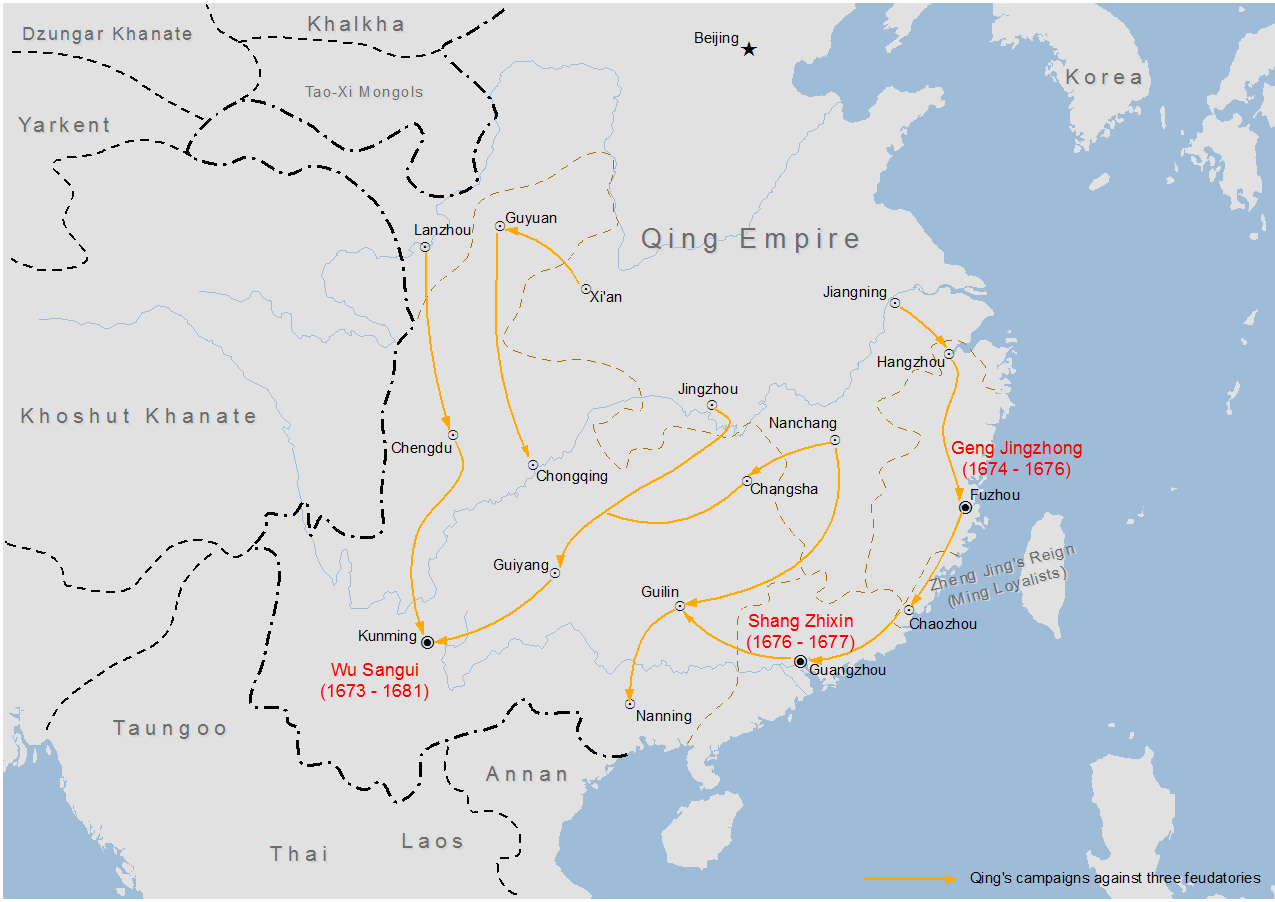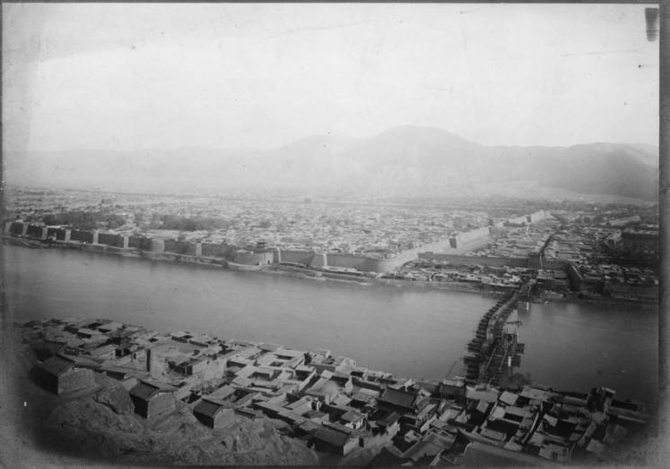|
Wang Fuchen
Wang Fuchen () (d. 1681) was a participant in the Revolt of the Three Feudatories during the Qing dynasty against the Kangxi Emperor. Wang was born in Datong, Shanxi Province, he was born to a poor family and grew up to be a bandit. His original surname was Li, nicknamed Horse-Sparrowhawk (馬鷂子) by the Manchu soldiers. Originally resisting the Manchu conquest of the Ming dynasty, ancient historians left behind records stating that Wang Fuchen was a handsome, tall and strong man with pale face, and thick eyebrows that resembled reclining silkworms. He was famous for his valour in battle and was known to the Manchus as a tough opponent, his presence was sometimes discouraging enough for the Manchu soldiers to retreat. He was highly regarded by Shunzhi Emperor and was won over to the Regent Dorgon. He assisted the former Ming dynasty generals Hong Chengchou and Wu Sangui in suppressing the Ming remnants of the Southern Ming. He followed Wu to Burma to capture and execute Zhu Youlan ... [...More Info...] [...Related Items...] OR: [Wikipedia] [Google] [Baidu] |
Revolt Of The Three Feudatories
The Revolt of the Three Feudatories, () also known as the Rebellion of Wu Sangui, was a rebellion in China lasting from 1673 to 1681, during the early reign of the Kangxi Emperor (r. 1661–1722) of the Qing dynasty (1644–1912). The revolt was led by the three lords of the fiefdoms in Yunnan, Guangdong and Fujian provinces against the Qing central government. These hereditary titles had been given to prominent Han Chinese defectors who had helped the Manchu conquer China during the transition from Ming to Qing. The feudatories were supported by Zheng Jing's Kingdom of Tungning in Taiwan, which sent forces to invade Mainland China. Additionally, minor Han military figures, such as Wang Fuchen and the Chahar Mongols, also revolted against Qing rule. After the last remaining Han resistance had been put down, the former princely titles were abolished. Background In the early years of the Qing Dynasty, during the reign of the Shunzhi Emperor, central government authority was not st ... [...More Info...] [...Related Items...] OR: [Wikipedia] [Google] [Baidu] |
Shaanxi
Shaanxi (alternatively Shensi, see #Name, § Name) is a landlocked Provinces of China, province of China. Officially part of Northwest China, it borders the province-level divisions of Shanxi (NE, E), Henan (E), Hubei (SE), Chongqing (S), Sichuan (SW), Gansu (W), Ningxia (NW) and Inner Mongolia (N). Shaanxi covers an area of over with about 37 million people, the 16th highest in China. Xi'an – which includes the sites of the former Capitals of China, Chinese capitals Fenghao and Chang'an – is the Xi'an, provincial capital as well as the largest city in Northwest China and also one of the oldest cities in China and the oldest of the Historical capitals of China, Four Great Ancient Capitals, being the capital for the Western Zhou, Western Han, Sima Jin, Jin, Sui dynasty, Sui and Tang dynasty, Tang List of Chinese dynasties, dynasties. Xianyang, which served as the Qin dynasty capital, is just north across Wei River. The other Prefectures of China, prefecture-level pr ... [...More Info...] [...Related Items...] OR: [Wikipedia] [Google] [Baidu] |
Generals From Shanxi
A general officer is an officer of high rank in the armies, and in some nations' air forces, space forces, and marines or naval infantry. In some usages the term "general officer" refers to a rank above colonel."general, adj. and n.". OED Online. March 2021. Oxford University Press. https://www.oed.com/view/Entry/77489?rskey=dCKrg4&result=1 (accessed May 11, 2021) The term ''general'' is used in two ways: as the generic title for all grades of general officer and as a specific rank. It originates in the 16th century, as a shortening of ''captain general'', which rank was taken from Middle French ''capitaine général''. The adjective ''general'' had been affixed to officer designations since the late medieval period to indicate relative superiority or an extended jurisdiction. Today, the title of ''general'' is known in some countries as a four-star rank. However, different countries use different systems of stars or other insignia for senior ranks. It has a NATO rank scal ... [...More Info...] [...Related Items...] OR: [Wikipedia] [Google] [Baidu] |
Politicians From Datong
A politician is a person active in party politics, or a person holding or seeking an elected office in government. Politicians propose, support, reject and create laws that govern the land and by an extension of its people. Broadly speaking, a politician can be anyone who seeks to achieve political power in a government. Identity Politicians are people who are politically active, especially in party politics. Political positions range from local governments to state governments to federal governments to international governments. All ''government leaders'' are considered politicians. Media and rhetoric Politicians are known for their rhetoric, as in speeches or campaign advertisements. They are especially known for using common themes that allow them to develop their political positions in terms familiar to the voters. Politicians of necessity become expert users of the media. Politicians in the 19th century made heavy use of newspapers, magazines, and pamphlets, as well a ... [...More Info...] [...Related Items...] OR: [Wikipedia] [Google] [Baidu] |
Suicides By Poison
Suicide is the act of intentionally causing one's own death. Mental disorders (including major depressive disorder, depression, bipolar disorder, schizophrenia, personality disorders, anxiety disorders), physical disorders (such as chronic fatigue syndrome), and substance abuse (including alcoholism and the use of and benzodiazepine withdrawal syndrome, withdrawal from benzodiazepines) are risk factors. Some suicides are impulsive acts due to stress (such as from financial or Suicide in colleges in the United States, academic difficulties), relationship problems (such as breakups or divorces), or harassment and bullying. Those who have previously attempted suicide are at a higher risk for future attempts. Effective suicide prevention efforts include limiting access to methods of suicide such as firearms, drugs, and poisons; treating mental disorders and substance abuse; careful mass media, media reporting about suicide; and improving economic conditions. Although crisis hotlin ... [...More Info...] [...Related Items...] OR: [Wikipedia] [Google] [Baidu] |
Suicides In The Qing Dynasty
Suicide is the act of intentionally causing one's own death. Mental disorders (including depression, bipolar disorder, schizophrenia, personality disorders, anxiety disorders), physical disorders (such as chronic fatigue syndrome), and substance abuse (including alcoholism and the use of and withdrawal from benzodiazepines) are risk factors. Some suicides are impulsive acts due to stress (such as from financial or academic difficulties), relationship problems (such as breakups or divorces), or harassment and bullying. Those who have previously attempted suicide are at a higher risk for future attempts. Effective suicide prevention efforts include limiting access to methods of suicide such as firearms, drugs, and poisons; treating mental disorders and substance abuse; careful media reporting about suicide; and improving economic conditions. Although crisis hotlines are common resources, their effectiveness has not been well studied. The most commonly adopted method of suic ... [...More Info...] [...Related Items...] OR: [Wikipedia] [Google] [Baidu] |
Qing Dynasty Generals
The Qing dynasty ( ), officially the Great Qing,, was a Manchu people, Manchu-led Dynasties in Chinese history, imperial dynasty of China and the last orthodox dynasty in Chinese history. It emerged from the Later Jin (1616–1636), Later Jin dynasty founded by the Jianzhou Jurchens, a Tungusic peoples, Tungusic-speaking ethnic group who Jurchen unification, unified other Jurchen tribes to form a new "Manchu" ethnic identity. The dynasty was officially proclaimed in 1636 in Manchuria (modern-day Northeast China and Outer Manchuria). It seized control of Beijing in 1644, then later expanded its rule over the whole of China proper and Taiwan under Qing rule, Taiwan, and finally Qing dynasty in Inner Asia, expanded into Inner Asia. The dynasty lasted until 1912 when it was overthrown in the 1911 Revolution, Xinhai Revolution. In orthodox Chinese historiography, the Qing dynasty was preceded by the Ming dynasty and succeeded by the Republic of China (1912–1949), Republic o ... [...More Info...] [...Related Items...] OR: [Wikipedia] [Google] [Baidu] |
1681 Deaths
Events January–March * January 1 – Prince Muhammad Akbar, son of the Mughal Emperor Aurangzeb, initiates a civil war in India. With the support of troops from the Rajput states, Akbar declares himself the new Mughal Emperor and prepares to fight his father, but is ultimately defeated. * January 3 – The Treaty of Bakhchisarai is signed, between the Ottoman vassal Crimean Khanate and the Russian Empire. * January 18 – The "Exclusion Bill Parliament", summoned by King Charles II of England in October, is dissolved after three months, with directions that new elections be held, and that a new parliament be convened in March in Oxford. * February 2 – In India, the Mughal Empire city of Burhanpur (now in the Indian state of Madhya Pradesh) is sacked and looted by troops of the Maratha Empire on orders of the Maratha emperor, the Chhatrapati Sambhaji. General Hambirrao Mohite began the pillaging three days earlier. * March 4 – King Char ... [...More Info...] [...Related Items...] OR: [Wikipedia] [Google] [Baidu] |
Fujian
Fujian (; alternately romanized as Fukien or Hokkien) is a province on the southeastern coast of China. Fujian is bordered by Zhejiang to the north, Jiangxi to the west, Guangdong to the south, and the Taiwan Strait to the east. Its capital is Fuzhou, while its largest city by population is Quanzhou, both located near the coast of the Taiwan Strait in the east of the province. While its population is predominantly of Chinese ethnicity, it is one of the most culturally and linguistically diverse provinces in China. The dialects of the language group Min Chinese were most commonly spoken within the province, including the Fuzhou dialect of northeastern Fujian and various Hokkien dialects of southeastern Fujian. Hakka Chinese is also spoken, by the Hakka people in Fujian. Min dialects, Hakka and Mandarin Chinese are mutually unintelligible. Due to emigration, a sizable amount of the ethnic Chinese populations of Taiwan, Singapore, Malaysia, Indonesia, and the Philippines ... [...More Info...] [...Related Items...] OR: [Wikipedia] [Google] [Baidu] |
Geng Jingzhong
Geng Jingzhong (; died 1682) was a powerful military commander of the early Qing dynasty. He inherited the title of "King/Prince of Jingnan" (靖南王) from his father Geng Jimao, who had inherited it from Jingzhong's grandfather Geng Zhongming. The "Dolo efu" (和碩額駙) rank was given to husbands of Qing princesses. Geng Jingmao managed to have both his sons Geng Jingzhong and Geng Zhaozhong (耿昭忠) become court attendants under the Shunzhi Emperor and marry Aisin Gioro women, with Prince Abatai's granddaughter marrying Geng Zhaozhong 耿昭忠 and Hooge's (a son of Hong Taiji) daughter marrying Geng Jingzhong. Geng Juzhong married Princess Heshou Roujia ( 和硕柔嘉公主) of the Manchu Aisin Gioro clan and daughter of Prince Yolo ( 岳樂), Prince An. Firmly entrenched as a quasi independent ruler in Fujian, in 1674 Geng Jingzhong rebelled against Qing rule along with the other two of the Three Feudatories Wu Sangui and Shang Zhixin, who were also governing enor ... [...More Info...] [...Related Items...] OR: [Wikipedia] [Google] [Baidu] |
Lanzhou
Lanzhou (, ; ) is the capital and largest city of Gansu Province in Northwest China. Located on the banks of the Yellow River, it is a key regional transportation hub, connecting areas further west by rail to the eastern half of the country. Historically, it has been a major link on the Northern Silk Road and it stands to become a major hub on the New Eurasian Land Bridge. The city is also a center for heavy industry and petrochemical industry. Lanzhou is one of the top 70 major cities in the world by scientific research output as tracked by the Nature Index. The city hosts several research institutions, including, Lanzhou University, Lanzhou University of Technology, Northwest Normal University, Lanzhou Jiaotong University, Gansu University of Chinese Medicine, and Gansu Agricultural University. Notably, Lanzhou University is one of China's prestige universities as a member of the Project 985. History Originally in the territory of the ancient Western Qiangs, Lanzhou ... [...More Info...] [...Related Items...] OR: [Wikipedia] [Google] [Baidu] |


.jpg)


